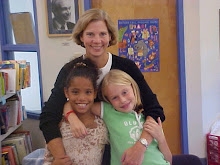Disruptive technology surrounds us: self-driving cars, software that writes poetry, drones delivering packages...When machines are competing with people for thinking, what's a human to do?!
Thomas Freidman has been thinking about this, and in his recent article From hands to heads to the hearts he answers that humans have what computers don't - a heart. He writes that everyone needs STEMpathy to succeed in this new age.
The attributes that can't be programmed are the ones we must develop in school, like passion, character and a collaborative spirit. It is crucial to combine knowledge with heart to if we want students to thrive in the technical age we live in.
It's a reminder of the importance of Parker's core values and mission, the right ones for our age, or any age.
This morning five alumni from 2008 and 2013 visited for a panel discussion. Represented were an art teacher and a novelist, a future biochemist, a future biomedical engineer, and a budding labor relations specialist. Their empathy was evident and the values and advice they espoused were about the importance of being friends with people who want to make you better, building relationships with teachers, and finding activities, clubs and subjects that you feel passionate about. They are all serious about ideas and value learning over grades.
They loved the fun they had at Parker - playing in the stream and being outdoors. They valued the friends and teachers. The thesis project was defining and prepared them for writing everywhere, even in college. They learned to learn for learning's sake, and felt proud of it. These young adults were definitely skilled in STEMpathy.











